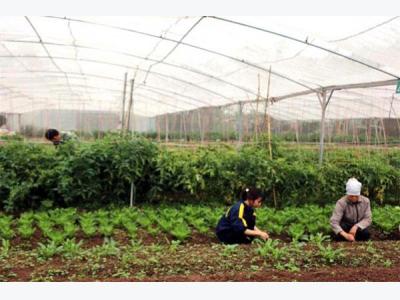VN needs legal framework for organic farms

Viet Nam will soon complete policies, mechanisms and a national standard system to develop organic farming in the future, Minister of Agriculture and Rural Development, Nguyen Xuan Cuong has said.
A BFarm Company organic farm in Ha Noi’s Thanh Tri District. – Photo: VNS
It is also one of the new directions for Vietnamese agriculture, he affirmed at a conference discussing measures to promote the production and consumption of organic agricultural products, held in Ha Noi yesterday.
Demand for organic farm produce has increased significantly both in Viet Nam and globally.
The early promotion of organic farming will play an important role in the restructuring of the agricultural sector, responding to the general trend of domestic consumption and export, Cuong said.
According to statistics from the Organic Agriculture Institute, in Viet Nam, organic agriculture was performed on around 76,000ha of land in 2015, an increase of 3.6 times compared with 2010.
Organic farming took place in Ha Noi, Hoa Binh, Lao Cai, Ha Giang, Ha Nam, Lam Dong and Ca Mau provinces, and some organic products have been consumed in the domestic market and exported to Japan, Germany, the UK, the US, South Korea, Russia and Singapore.
There are some successful organic models such as Hoa Sua Foods organic rice brand by Ca Mau-based Vien Phu Organic and Healthy Foods Joint Stock Corporation, vegetable production by Organik Da Lat, a unique thick-skinned orange in Ham Yen, Tuyen Quang Province, and others. However, only 30 out of 63 provinces across the country have implemented an organic farming model, according to the Ministry of Agriculture and Rural Development (MARD).
There are 3,000ha of coconut in Ben Tre Province and 448ha of grape, apple and vegetables in Ninh Thuan Province, and some other organic farms in Ha Noi, and the provinces of Hoa Binh, Lao Cai and Tuyen Quang Province, the ministry said.
Delegates at the seminar agreed that most farmers do not want to switch to organic farming due to rigorous production processes, significant time for land reclamation, high production costs and unstable markets.
Additionally, the standards for certifying produce as organic are not clear, according to Ha Phuc Mich, chairman of Viet Nam Organic Agriculture Association.
"Viet Nam still lacks a national standards system and a comprehensive legal framework for production, certification and quality control of organic agricultural products while trust of organic products among consumers remains low," said Deputy Minister Tran Thanh Nam.
"We have to plan and protect the land and unpolluted water for organic farming to motivate people to participate in organic farm produce,” Nam said
The system of standards, production, processing and quality certification should be completed soon, he said.
At the same time, the work on inspection and supervision of organic agriculture production should be done regularly to help consumers gain peace of mind in using organic food which have been certified and qualified, Nam added.
MARD is encouraging businesses to invest in organic farm production, organic and bio-fertilisers and biocides, he said.
“The government needs to prioritise land and credit policies for organic agriculture development, and issue good policies to attract investment in organic farming," said Nam.
The ministry will collect shortcomings and propose that the Government issues resolutions on organic farming produce, minister Cuong said.
At the same time, it will also work with related ministries of science and technology and natural resources and environment to complete the standards system and remove difficulties related to land policy for enterprises, he said.
Có thể bạn quan tâm
 Vietnam's coffee cup could overfill two weeks earlier this year
Vietnam's coffee cup could overfill two weeks earlier this year This year's rainy season is expected to return earlier than usual to Vietnam's coffee belt in the Central Highlands, with regular showers forecast from late
 Farmers fear VND100 trillion credit package inaccessible
Farmers fear VND100 trillion credit package inaccessible The government’s announcement about the huge credit package of VND100 trillion to support hi-tech agriculture has caused concern among farmers,
 $4.4 billion enough to build hi-tech agriculture in Vietnam?
$4.4 billion enough to build hi-tech agriculture in Vietnam? The government has decided to disburse VND100 trillion for farming projects to help develop hi-tech agriculture